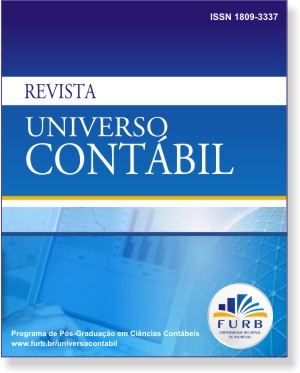PARADOXO NA UTILIZAÇÃO DE ARTEFATOS CONTÁBEIS GERENCIAIS: DISCUSSÃO SOBRE A INFLUÊNCIA DE FATORES INCONSCIENTES INSPIRADA EM CONCEITOS PRECONIZADOS PELA PSICOLOGIA ANALÍTICA
DOI:
https://doi.org/10.4270/ruc.20117Palavras-chave:
Contabilidade gerencial. Artefatos contábeis gerenciais. Fatores inconscientes. Psicologia analíticaResumo
O presente ensaio foi desenvolvido com a finalidade de fornecer elementos que contribuam para um melhor entendimento da postura do profissional contábil, que possam elucidar algumas possíveis razões do paradoxo existente entre o conhecimento teórico e a adoção dos artefatos contábeis gerenciais, por meio de fatores inconscientes, sob a inspiração dos conceitos preconizados pela psicologia analítica. Por meio da análise crítico-reflexiva realizada, ponderou-se que [1] a contabilidade gerencial possui hábitos e rotinas repetitivas e mecanicistas, constituindo um inconsciente coletivo próprio, dominado por arquétipos, difíceis de serem modificados; [2] os arquétipos junguianos persona e sombra representam as informações evidenciadas ou sonegadas, respectivamente, em contabilidade gerencial; [3] os arquétipos junguianos anima e animus demonstram as relações de gênero em contabilidade gerencial; [4] o self é demonstrado como o ponto de decisão constantemente buscado. Destaca-se também que o presente ensaio teórico possui implicações acadêmicas e profissionais para a ciência contábil, no que tange à postura do contador no processo de tomada de decisão.Downloads
Downloads
Publicado
Como Citar
Edição
Seção
Licença
Os direitos autorais para artigos publicados nesta revista são do autor, com direitos de primeira publicação para a revista. Em virtude de aparecerem nesta revista de acesso público, os artigos são de uso gratuito, com atribuições próprias, em aplicações educacionais e não-comerciais. A revista permitirá o uso dos trabalhos publicados para fins não-comerciais, incluindo direito de enviar o trabalho para bases de dados de acesso público. Os artigos publicados são de total e exclusiva responsabilidade dos autores.
• O(s) autor(es) autoriza(m) a publicação do artigo na revista;
• O(s) autor(es) garante(m) que a contribuição é original e inédita e que não está em processo de avaliação em outra(s) revista(s);
• A revista não se responsabiliza pelas opiniões, ideias e conceitos emitidos nos textos, por serem de inteira responsabilidade de seu(s) autor(es);
• É reservado aos editores o direito de proceder ajustes textuais e de adequação do artigo às normas da publicação;
• O(s) autor(es) declaram que o artigo não possui conflitos de interesse.


